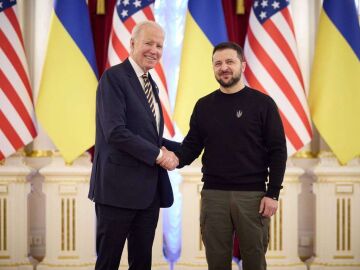
The United States confirmed this Friday that will send cluster bombs to Ukraine despite criticism from Germany and from organizations such as Human Rights Watch (HWR), which are concerned about the impact of these weapons on the civilian population.
The cluster bombs are included in a new military aid package for Ukraine that the Pentagon will later provide details of, White House National Security Adviser Jake Sullivan explained at a press conference.
Sullivan has said that the US has delayed this decision as much as possible, but has explained that the Ukrainian troops need conventional artillery ammunition because the amount they have available has decreased with the counter-offensive that Kyiv launched in early June to retake the areas occupied by Russia.
According to Sullivan, the Ukrainian government delivered to Washington “a few weeks ago” a document in which it promised that its armed forces will only use these cluster bombs in the battlefield and not in urban areas where there may be harm to civilians. Those promises were included in the formal request that the Ukrainian government made to the United States to request the delivery of those cluster bombs, the White House National Security Adviser has detailed.
Cluster bombs consist of a container that opens in midair and disperses a large amount of explosive submunitions or “bomblets” over a wide area, which can reach a radius of between 200 and 400 meters. The problem is that some of these “bomblets” do not explode when they explode against the ground and remain buried, so that they can detonate past the years when a civilian passes through the area.
Asked about these concerns, Sullivan has assured that the bombs that the US will deliver to Ukraine have a non-explosion rate -those that fail and remain buried- of less than 2.5%. By contrast, cluster bombs reportedly used by Russia have a 30-40% non-explosion rate, according to Sullivan.
More than 100 countries oppose
More than a hundred countries, including NATO members such as France and Germany, oppose the use of cluster bombs. and they have ratified the Convention on Cluster Munitions, which entered into force in 2010 and to which Ukraine, Russia and the United States are not party.
Germany, which was one of the first countries to ratify the Convention, on Friday expressed its disagreement with the US decision. For his part, the Secretary General of NATO, Jens Stoltenberg, has tried to stay out of it and has affirmed this Friday that each member state of the Alliance must decide individually whether to deliver cluster bombs to Ukraine.
The HRW organization has asked Ukraine and Russia to stop using cluster bombs and, in addition, urged the United States on Thursday to do not deliver that type of weapon to Kyiv.
Source: Lasexta
Ricardo is a renowned author and journalist, known for his exceptional writing on top-news stories. He currently works as a writer at the 247 News Agency, where he is known for his ability to deliver breaking news and insightful analysis on the most pressing issues of the day.











